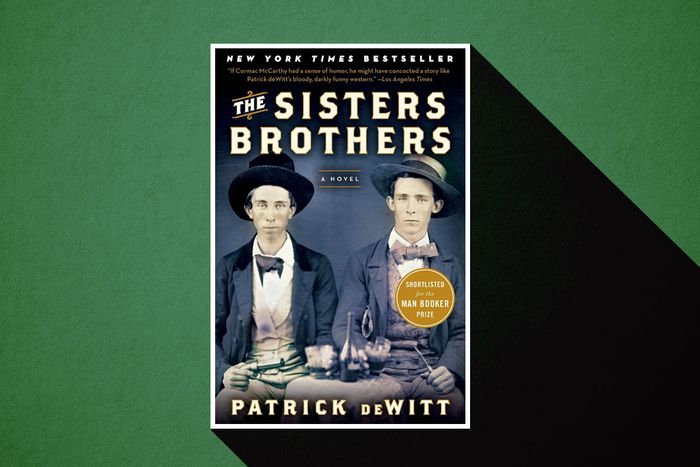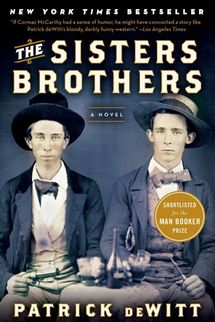
Looking for some quality comedy entertainment to check out? Who better to turn to for under-the-radar comedy recommendations than comedians? In our recurring series “Underrated,” we chat with writers and performers from the comedy world about an unsung comedy moment of their choosing that they think deserves more praise.
According to comedian Josh Gondelman, Patrick deWitt’s 2011 novel The Sisters Brothers achieves something most books aren’t able to: laugh-out-loud humor. The novel follows two brothers, Eli and Charlie, on a quest to California to track down a man they were hired to kill. Though the story doesn’t shy away from aggressively violent encounters with the people they meet on the trail, the tone of the story dips into absurdity more than outright despair. They run into a man who can’t stop hysterically crying, a kid at an abandoned campsite who keeps getting knocked in the head by everyone he meets, and a dentist who describes how he gamed the system and cheated in order to get his dental license, all while extracting a tooth at the same time. Nominated for a number of awards and winning a few, the novel enjoyed moderate success when it was published but never hit the best-sellers list.
Recently, the title has become more well-known for the 2018 film adaptation, starring John C. Reilly and Joaquin Phoenix. The movie received critical praise but was a box-office disappointment, only pulling in $13 million worldwide against a $38 million budget. But Gondelman has not seen this movie. His focus remains on just how funny the book is, how hard humor is to capture in a novel, and how comedy presented in a prose narrative has influenced his stand-up writing style for his new special, People Pleaser, which is available to rent on a variety of streaming platforms.
What about this book drew you in when you read it the first time?
This is right in my wheelhouse as a soapbox I always get on because I’m always complaining that the legendary novels people describe as “comic novels” so often leave me a little bit cold, or I find them to be more heartbreaking than funny. I was talking about this with my wife, Maris Kreizman, who’s a book critic and podcaster, and she was like, “Okay, here are the two books that are legitimately laugh-out-loud funny.” One of them was The Sisters Brothers, and the other was The Sellout by Paul Beatty. Her recommendations could not have been more dead-on. Both of them are absolutely what I want when someone tells me a book is “funny.”
I think I know what you mean about heartbreaking. The book A Confederacy of Dunces is often touted as one of the great comedic novels, but I found myself with a lump in my throat every paragraph I read because of how truly awful this person’s life was turning out to be.
I’m so glad you brought this book up because it’s like 700 pages long and people talk about it as a comedic masterpiece! I do think it’s an incredibly visceral, uncomfortable experience reading this book. It is a literary achievement to create this kind of character that you’re just, like, Oh, no! You’re just watching a car crash for 700 pages. But I didn’t laugh. I was thinking, Is it supposed to be funny because someone jerks off? That doesn’t make it hilarious to me, but I don’t think it’s a bad thing. I’ve gotten into arguments with people who are like, “No, it’s a comic masterpiece,” and it just doesn’t do it for me on that level.
Speaking of characters masturbating, one of the recurring gags in The Sisters Brothers is our narrator Eli using “the soothing method” for when he gets too angry, and the reader slowly deduces that his mom once told him to masturbate by himself as a means of calming down. A key element of this book is this subtle narration from Eli where you don’t really get the whole picture of what’s happening; you just get his commentary on things and slowly see the bigger picture. Does that kind of narrative speak to you?
I really like the dryness of it. I like a subtle comedy. Especially in a book, I think it can be more wry and witty because you’re experiencing it through reading and taking it at your own pace. I think Patrick deWitt does a great job at giving us more with less. You don’t have to say everything that’s happening because the experience of reading is more sparse than in a film. It can be a little drier and stay really sharp and funny, whereas I think that’s a tough tone to translate into a movie.
Honestly, it reminds me of the dry humor of True Grit. It has a very Coen brothers dryness to it, which I love in movies but I think is so hard to achieve. There’s the little subtle hints of Eli being kind of a dumbass as a narrator. l think it’s really elegantly done — that with just a few pen strokes from the author, we are brought into this world, and we see what’s happening through the lens of this guy who doesn’t fully understand what’s going on.
Mentioning True Grit is interesting because it almost feels like a better adaptation of this book than the movie this book is based on.
I never saw the movie! I do think that True Grit and this book feel like they capture similar ideas. It’s all very violent, but also really quirky and wry in a way that plays really well. The tone could easily have gone too bleak or too twee in this book. It’s so dense with things that are fun and whimsical and funny and ironic without being this morality play about a slow-witted man who roams the West contract killing.
I think that morality-play point is also really intriguing because this is an extremely violent and bleak story …
It’s so violent.
… and I think the narration through Eli makes everything so simple and plain. So when you hear about, like, the bear attacking his horse and clawing out his eye, it’s presented as Well, that’s a shame more than Oh my God, his eye is hanging out of his skull.
And that’s all at the beginning, and there’s already been one horse that was destroyed in a fire. There’s so much violence! It almost feels like Of Mice and Men but narrated by Lennie.
That makes so much sense.
It’s just him seeing these things happening, and he has this real bleakness to his thoughts, and he’s just kind of going along for the ride. He doesn’t have this acuity that his brother has. And he knows that, but he still is able to see the world through this lens of Huh, isn’t that weird?
And there is poignancy to it — like, I don’t think we’re laughing at Eli, right? We’re laughing at his view: This violence is inevitable. And I guess I just roam the prairie doing violence with my brother. Then it kind of turns into Oh, you could just quit. It’s just so funny to imagine these cowboy outlaws saying, “I guess we live with our mom again now,” like they got fired from a GameStop or something. I think it’s really elegantly done so that you feel the horror of it. It’s not saying, “Violence is cool and fun.” It’s saying, “Violence is horrible, and isn’t it weird that we just keep doing this?”
What is the part of the book that really grabbed you for the first time and made you go, Oh, so this is a comedy comedy?
To go back to the Coen brothers, it almost felt like O Brother, Where Art Thou?, which I guess goes back to The Odyssey. It’s just meeting a bunch of weird guys on the road. Like the early scene where Eli needs teeth extracted and the dentist is just a frontier dentist, just talking about how he’s a loser and he says, “Name a job. I’ll tell you how I failed at it.” It’s so funny. It didn’t have to be funny. The scene could have just as easily been that he meets this dentist; it’s painful.
Or how he gets the novocaine for the first time, and they know that they want this painkiller as a tool of their violence. It could be a poignant moment of Oh, you can be hurting someone so much without them ever realizing it, but instead, it’s just this loser dentist that they rob, and then the dentist also teaches him how to brush his teeth. I think that this book clearly has a center to it — like an emotional and philosophical center to it — but it’s just balanced out by this kind of goofiness of a guy being like, “Ah, I even suck at being a dentist.”
Do you find yourself taking inspiration from books like this when you’re writing your own stand-up?
I don’t think I consider it directly, but this book is such an exercise in tonal consistency and character-based comedy, where the things being said aren’t always witty right from the characters. It’s not like Seinfeld or Friends or Cheers, where characters are sitting around saying funny things to each other. The humor in this springs so clearly from how we know who these characters are, and then the way they express themselves is funny because of their strange understanding of the world. I think that that is such a lesson in creating this tone that the characters are being true to themselves, and the comedy is flowing from there. So in stand-up, I think it’s helpful to know you don’t have to sell out yourself or your story to get a laugh; you can make the laugh come from who you are. That’s a lesson that applies to all kinds of comedy writing: The joke can come from the depth of understanding of who the character is or what the theme and tone are.
Let’s say you have three minutes alone with somebody at a party and you’re talking about this book that you really love, The Sisters Brothers. How would you sell them on it?
I will say it’s one of the few novels I’ve read that’s laugh-out-loud funny, but it’s also a thrilling western adventure story. This is not universal, but I would say it is a great recommendation for dudes — and I mean “dudes” across a gender spectrum. I’ve had a lot of luck recommending this book because it feels like Jack Black in High Fidelity talking about Evil Dead II, where he’s like, “It’s so funny and violent!” So many books feel like homework, and so many books that we’re told are funny are, again, bone-dry literary humor, and this book hits the humor elements in a way that feels more visceral, where you get the full pleasure of a joke.
More From This Series
- F Is for Family: Bill Burr’s Love Letter to the ’70s
- It’s Time to Appreciate SNL’s ‘Riley’ Sketch, Bitch
- Take a Bite Out of Horowitz & Spector


